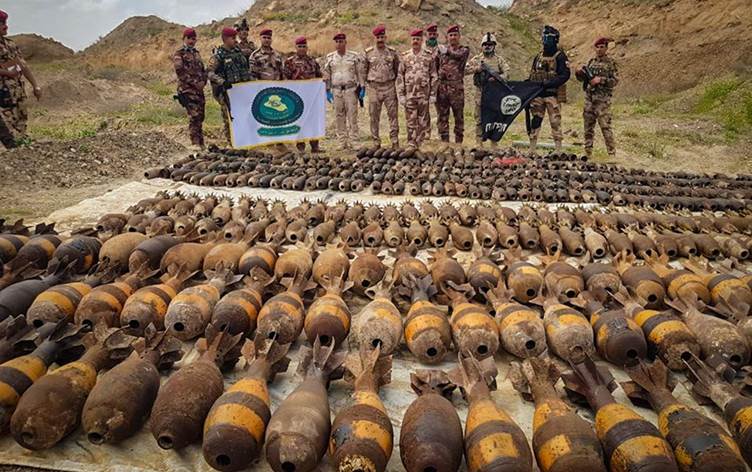Iraqi army: 82 civilians killed in ISIS attacks this year

Advertisement
ERBIL, Kurdistan Region – Eighty-two Iraqi civilians were killed and 120 injured between January 1 and April 15 as a result of the conflict between the Iraqi Security Forces (ISF) and Islamic State (ISIS) militants, the ministry of defense acknowledged on Tuesday evening.
Despite the coronavirus pandemic and coalition withdrawal from several bases across the country, the ISF has conducted 1,060 operations and killed 135 targets since January 1, defense ministry spokesman Yehia Rasool said in a series of tweets.
According to these latest figures, operations took place in every Iraqi province aside from those in the Kurdistan Region over the first 15 weeks of 2020, to clear bomb factories, arms caches, and secret tunnels used by the jihadists, Rasool said.
At least 88 ISF soldiers were killed and 174 wounded during these operations.
In a phone call with Rudaw English on Wednesday, Rasool claimed that all civilian deaths in the time period were a result of ISIS attacks and explosive devices planted by the group.
“The civilians have been martyred due to ISIS attacks, explosive devices, and other terrorist attacks by the group,” Rasool said. “No civilians died due to Iraqi Security Forces military operations.”
UNIAMI spokesman Samir Ghattas said the agency is unable to publish casualty figures for the period in question, but said the death toll is significantly lower than it has been in previous years.
“We are closely following the continuing attacks and recording casualty figures, but for now we are not yet publicly releasing the casualty figures from the use of improvised explosive devices, explosive remnants of war, rocket or mortar rounds and small arms fire attacks allegedly perpetrated by ISIL (ISIS) remnants during the period of 1 January to 15 April,” Ghattas told Rudaw English via email.
“But what we can say is that those figures are considerably lower than what we used to record at the height of the conflict with Daesh in recent years,” he added, using the Arabic acronym for ISIS.
Mohammed al-Jumaily, Iraq researcher for war monitor Airwars, said although the civilian casualties during this period are likely the result of ISIS activities, more information about these incidents should be made public.
“The numbers given by the Ministry of Defence (MoD) spokesman are likely referring to those killed and wounded by ISIS actions rather than Iraqi military actions, as it is quite rare for the MoD to make admissions to civilian harm in this way,” Jumaily told Rudaw English in an email.
“Having said this, the numbers beg more detail about the incidents from which these casualties came about in order to make a more concrete assessment on them,” he said.
“Furthermore, it is important to bear in mind that the vast majority of Iraqi military operations have shifted away from urban areas to more rural and mountainous areas where there are lower numbers of civilians present, thus potentially limiting the risk to civilians – though not at all excluding the possibility that civilians would have been harmed in these operations,” he added.
Although the government announced the territorial defeat of ISIS in Iraq in December 2017, remnants of the group have returned to their earlier insurgency tactics, ambushing security forces, kidnapping and executing suspected informants, and extorting money from vulnerable rural populations.
ISIS seized vast swathes of Syria and northern Iraq in the summer of 2014, including Mosul and other large Sunni-majority cities.
Baghdad called on the international community to form a coalition to help fight ISIS in Iraq. At the height of its power between 2014 and 2016, ISIS controlled an area roughly the size of Great Britain, spread across both Iraq and Syria.
ISIS insurgent activities have increased in recent weeks, with militants killing five soldiers and wounding three more in three separate incidents in Diyala and Kirkuk provinces.
ISIS militants also killed an Iraqi federal police officer at a checkpoint in Hawija, western Kirkuk on April 12, according to defense officials.
Defense Minister Najah al-Shammari vowed last week to “ramp up” the government’s anti-ISIS efforts, and stop the group’s attacks amid the coronavirus pandemic.
Jabar Yawar, chief of staff at the Ministry of Peshmerga Affairs, warned earlier in April that the ISIS resurgence has been underway for some time.
“According to our data, the group increased its activities in 2018 and 2019, especially in Kurdistani areas outside of the Kurdistan Region administration, including Diyala, Hamrin, Kirkuk, Tuz Khurmatu, and Qarachogh. In Qarachogh, they even established bases,” Yawar told Rudaw.
The latest Pentagon Inspector General report, covering October 1 to December 31, said ISIS are still active, capable of conducting small-scale attacks.
“ISIS maintained both freedom of movement and the ability to hide and transport fighters and materiel in rural areas where [the Iraqi Security Forces] presence is less intense and ISIS can more easily avoid detection and capture,” the Lead Inspector General report said.
“ISIS retains enough manpower and planning capabilities to conduct regular small-scale attacks or ambushes against the ISF, the PMF, or local civilians accused of aiding the ISF or informing on ISIS activities,” it added.
Advertisement







